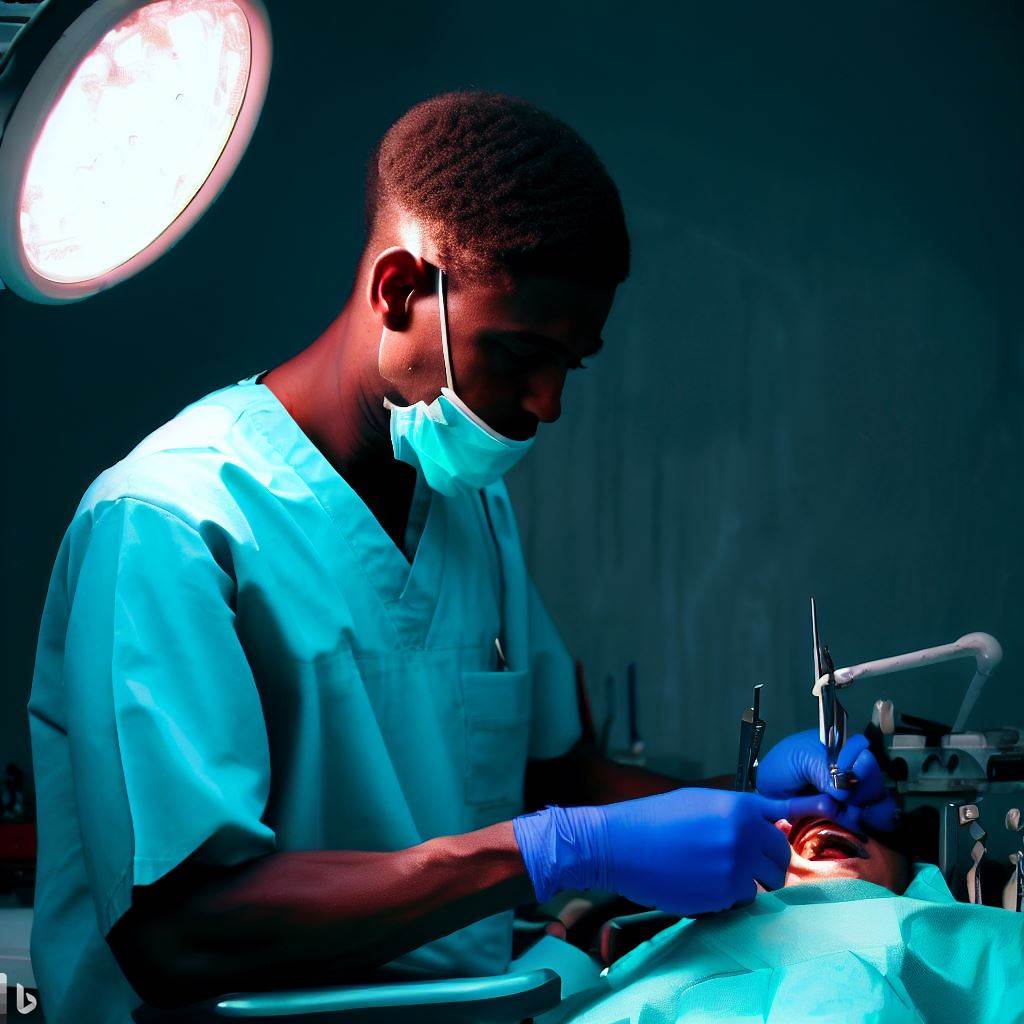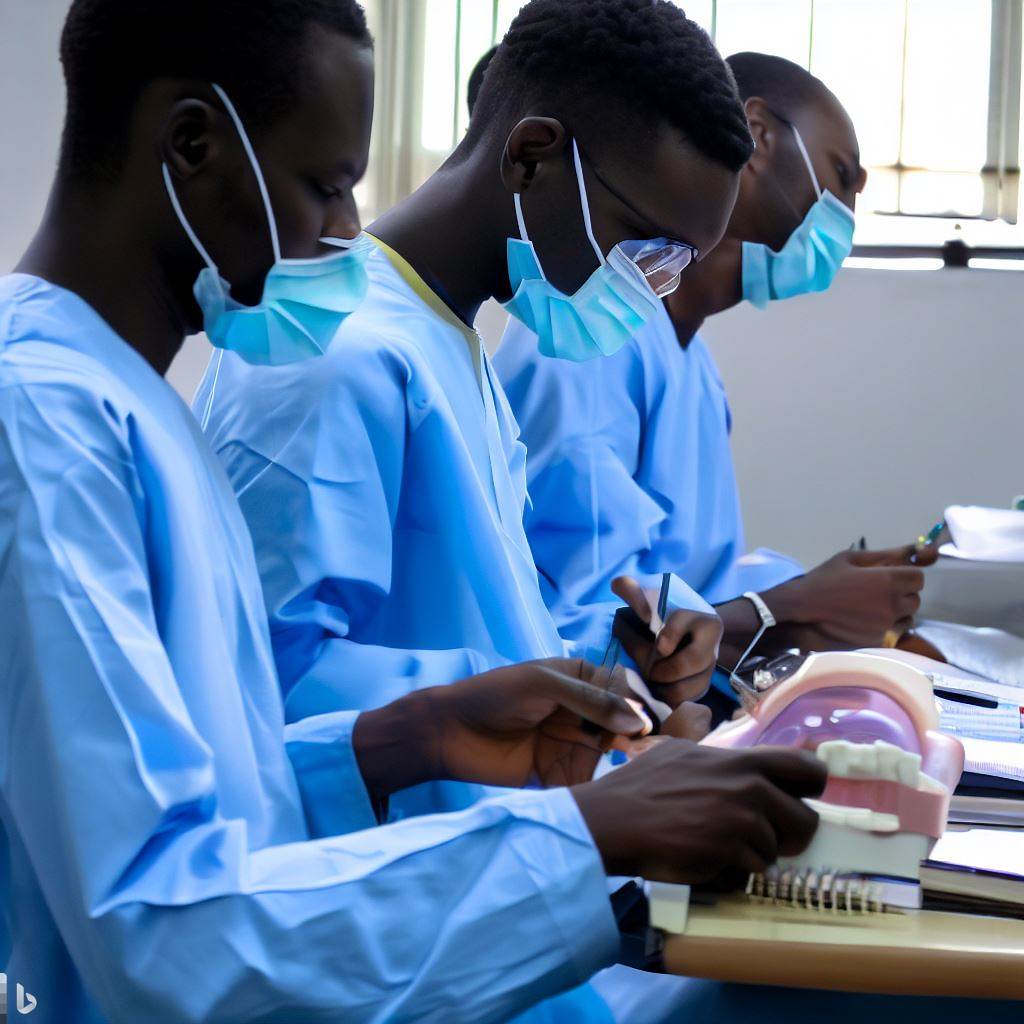Introduction
Dental health is crucial in Nigeria, and dentists play a significant role in maintaining it. However, dentists face challenges that affect their ability to provide the best care to everyday Nigerians.
In this blog post, we will explore these challenges in detail and shed light on the obstacles dentists encounter in their mission to promote better oral health.
From limited access to dental services in remote areas to the cost of treatments and the need for patient education, we will examine the issues that impact the dental care landscape in Nigeria. By understanding these challenges, we hope to raise awareness and find ways to improve dental health for all Nigerians.
Lack of Awareness and Importance of Oral Health
Low prioritization of oral health by the public
Dentists in Nigeria face challenges due to the low prioritization of oral health by the public. Most people do not consider oral health as important as other medical needs.
As a result, they often neglect regular dental check-ups and fail to maintain proper oral hygiene. This lack of prioritization leads to a higher prevalence of dental problems in the population.
Lack of knowledge about dental care and its impact on overall health
Another challenge faced by dentists in Nigeria is the lack of knowledge about dental care and its impact on overall health. Many people are unaware of the connection between oral health and various systemic diseases.
This lack of awareness results in delayed treatment seeking and poor oral health behaviors. Without proper understanding, individuals do not realize the importance of oral health in maintaining overall well-being.
Limited access to oral health education programs
Dentists in Nigeria also struggle with limited access to oral health education programs. There is a scarcity of initiatives to educate the public about oral hygiene practices, preventive measures, and the significance of regular dental check-ups.
This lack of educational resources hinders the dissemination of vital information and further perpetuates the ignorance surrounding oral health. Hence, dentists in Nigeria face several challenges related to the lack of awareness and importance of oral health.
The low prioritization of oral health by the public, coupled with a lack of knowledge about dental care and limited access to oral health education programs, contributes to the prevalence of dental problems in the country.
Read: Dietitian vs Nutritionist: Distinctions in the Nigerian Context
Insufficient Infrastructure and Resources
One major obstacle dentists in Nigeria may encounter is the insufficient infrastructure and resources available to support their work. This lack of adequate infrastructure negatively impacts both dentists and their patients.
- Shortage of well-equipped dental clinics and facilities: The number of well-equipped dental clinics and facilities falls significantly short of the demand in Nigeria.
As a result, dentists often have to work in substandard conditions, with limited access to the necessary tools and equipment to provide quality dental care.
This compromises the effectiveness of their treatments and hampers their ability to address the oral health needs of the population. - Limited availability and accessibility of dental equipment and materials: Dentists struggle with the limited availability and accessibility of dental equipment and materials in Nigeria.
Due to import restrictions, high costs, and inadequate supply chains, dentists often have difficulty acquiring the latest dental technology and materials needed to perform advanced procedures.
This hinders their ability to provide the best possible care to their patients and forces them to rely on outdated equipment. - Inadequate funding for dental research and development: Another challenge faced by dentists in Nigeria is inadequate funding for dental research and development.
This lack of financial support limits the progress of dental science and technology in the country.
Without sufficient funding, dentists are unable to conduct research, develop innovative techniques, or keep up with advancements in dental care.
This impedes their ability to offer the latest treatments and compromises the overall quality of dental services provided in Nigeria.
Insufficient infrastructure and resources in dentistry have far-reaching consequences for dentists and patients alike. Patients endure hardships, traveling long distances for care, especially in rural or low-income areas.
Treatment delays and substandard outcomes result from limited dental equipment and materials. Nigeria needs a collaborative approach involving the government, regulatory bodies, and dental associations to tackle these challenges.
Investing in well-equipped dental clinics and facilities is vital. Improving dental equipment and material accessibility is crucial to streamlining imports and exploring local manufacturing.
Additionally, increased funding for dental research will lead to advancements in oral healthcare and better services for Nigeria’s population. Addressing these issues will uplift oral healthcare outcomes and enable dentists to deliver high-quality services.
Inadequate Training and Education
Nigeria faces significant challenges in providing adequate training and education for dentists. This is due to limited dental schools and programs available in the country.
- Limited dental schools and programs in Nigeria: The number of dental schools in Nigeria is significantly low compared to the population’s needs. This scarcity creates a shortage of qualified dental professionals to meet the demand.
- Lack of specialization opportunities for dentists: In Nigeria, there is a lack of opportunities for dentists to specialize in particular fields. This limitation deprives dentists of the chance to gain in-depth knowledge and expertise in specific areas of dentistry.
- Insufficient continuous professional development opportunities: The continuous professional development of dentists plays a vital role in maintaining and improving their skills.
However, in Nigeria, there is a lack of opportunities for dentists to enhance their knowledge and stay updated with the latest advancements in dental care techniques and technologies.
In Nigeria, dentists face challenges in providing top-quality care, leading to suboptimal oral health outcomes for patients. To address this, investing in dental education programs and more schools is crucial. Expanding dental schools will enable more students to pursue dentistry, increasing the number of dentists available.
The establishment of specialized dental centers and departments can create more opportunities for dentists to specialize.
In addition, offering postgraduate training and research opportunities will improve dental care outcomes. The Nigerian government should prioritize continuous professional development programs, like workshops and online modules, to keep dentists updated on the latest advancements.
Collaboration with international organizations will also enhance knowledge exchange and training for Nigerian dentists. For example, dental conferences can improve networking and collaboration among professionals, fostering a learning environment.
Inadequate training and education present significant challenges, which can be tackled through these initiatives. The goal is to improve the quality of dental care and ensure better oral health outcomes for the population.
Read: Evaluating the Impact of Dietitians on Nigerian Healthcare
High Cost of Dental Services
Dentistry in Nigeria faces a significant challenge due to the high cost of dental services. This challenge stems from various factors that make dental treatments unaffordable for a large portion of the population.
Inability to afford dental treatments
One of the major challenges dentists in Nigeria face is the inability of a significant portion of the population to afford dental treatments. Dental care, including routine check-ups, fillings, and extractions, can be expensive, making it inaccessible for many Nigerians.
The high cost of dental services puts oral health out of reach for those belonging to lower-income brackets. As a result, individuals may delay or avoid seeking dental care, leading to oral health complications and the progression of dental problems.
Limited insurance coverage for dental care
Another obstacle faced by dentists in Nigeria is the limited insurance coverage for dental care. Many health insurance plans in the country provide limited or no coverage for dental treatments, making patients bear the entire financial burden.
This lack of dental insurance coverage further contributes to the high cost of dental services. Without insurance support, individuals have to pay out-of-pocket for dental care, making it prohibitive for many.
High costs of dental materials and equipment due to importation
Dental materials and equipment needed for providing quality dental care are often imported into Nigeria. This importation process increases its costs due to factors such as taxes, customs duties, and shipping expenses.
The high costs of importing dental materials and equipment have a direct impact on the overall cost of dental services. In some cases, dentists may have to bear these additional expenses, which ultimately get passed on to the patients.
The high cost of dental services in Nigeria poses significant challenges for dentists and the population at large. Many Nigerians struggle to afford dental treatments, and limited insurance coverage adds to the financial burden.
Furthermore, the importation of dental materials and equipment leads to additional costs, making dental services even more unaffordable.
It is essential to address these challenges to ensure that oral healthcare becomes more accessible and affordable for all Nigerians.
Read: Why the Demand for Dietitians is Rising in Nigeria

Hygiene and Sterilization Concerns
The maintenance of hygiene and sterilization in dental clinics is of utmost importance to ensure the safety and well-being of both dentists and patients. However, dentists in Nigeria face several challenges in this area, including:
- Lack of awareness and adherence to proper infection control protocols: Many dentists in Nigeria are not fully aware of the importance of following strict infection control protocols.
This lack of awareness leads to non-compliance, putting both dental professionals and patients at risk of contracting infections. - Insufficient availability of sterilization materials and equipment: Another challenge faced by dentists is the limited availability of sterilization materials and equipment.
Due to a lack of proper resources, dentists may not be able to effectively sterilize their instruments, increasing the risk of cross-contamination. - Limited implementation of hygiene standards in dental clinics: Despite the existence of hygiene standards, their implementation is often lacking in dental clinics across Nigeria.
This can be attributed to a variety of factors, including a lack of enforcement and monitoring by regulatory bodies.
Dentists and dental clinics in Nigeria must prioritize hygiene and sterilization to address challenges effectively. They can take the following steps:
- Regularly educate and train dentists on infection control and hygiene practices to raise awareness.
- Ensure the availability of affordable sterilization materials and equipment through government support.
- Strengthen regulatory measures to enforce hygiene standards with regular inspections and audits.
- Conduct public awareness campaigns to highlight the importance of hygiene in dental care.
- Foster collaboration among dentists to share best practices and improve overall standards in the profession.
Prioritizing hygiene and sterilization ensures patient safety and maintains high standards of dental care in Nigeria.
Read: Unveiling the Salary Structure of Dietitians in Nigeria
Dental Workforce Distribution Gap
In Nigeria, the dental profession faces significant challenges in terms of workforce distribution. This has led to a concentration of dental professionals in urban areas, leaving rural areas underserved.
- Concentration of dental professionals in urban areas: One major challenge faced by dentists in Nigeria is the unequal distribution of dental professionals.
The majority of dentists tend to practice in urban areas, where there is a higher demand for dental services. This concentration contributes to a scarcity of dental care options in rural areas. - Underserved rural areas: The uneven distribution of dentists across Nigeria has resulted in inadequate dental care services in rural areas.
Many people living in these regions do not have access to basic dental treatments and are forced to travel long distances to urban centers for dental care. - Importation of foreign dental professionals: Due to the inadequate local dental workforce, Nigeria often relies on the importation of foreign dental professionals to meet the growing demand for dental care services.
While this helps to address the workforce shortage to some extent, it does not provide a sustainable solution.
The concentration of dental professionals in cities creates disparities in dental care availability. Dentists in urban areas face overwhelming workloads and struggle to provide individualized care, leading to burnout.
The unequal distribution of dentists also hampers government efforts to implement preventive dental care programs that educate the population and prevent dental diseases.
To bridge the dental workforce distribution gap in Nigeria, several measures can be taken:
- Encourage dentists to practice in rural areas by offering financial benefits, infrastructure development, and professional growth opportunities.
- Establish dental schools in underserved regions to train local dental professionals, ensuring more equitable distribution.
- Improve oral health awareness in underserved areas through campaigns, outreach programs, and collaborations with local healthcare providers.
Discover More: Nigeria’s Paramedic Profession: An Inside Look
Government Policies and Regulations
Government Policies and Regulations: Overcoming Challenges in the Dental Field
Inconsistencies in dental licensing and registration procedures continue to pose significant challenges for dentists in Nigeria.
The lack of standardized processes makes it difficult for professionals to obtain the necessary licenses and registrations to practice dentistry. This inconsistency creates an atmosphere of uncertainty and discourages many talented individuals from pursuing a career in dentistry.
Additionally, there is limited government support for dental associations and organizations in Nigeria. This lack of support hinders the growth and development of these crucial entities, which play a vital role in shaping the dental landscape.
Without adequate funding and recognition, dental associations struggle to provide valuable resources, education, and advocacy for their members.
Another pressing issue is the lack of dental health policies and regulations enforcement. While Nigeria has some dental health policies in place, the implementation and enforcement of these regulations are inconsistent.
This lack of enforcement undermines the effectiveness of these policies and fails to safeguard the oral health of Nigerians.
To overcome these challenges, it is essential for the government to address the inconsistencies in licensing and registration procedures. Standardizing these processes will provide clarity and enable dentists to confidently pursue their careers.
The government must allocate funds and resources to support dental associations, enhancing their offerings.
Dental health policies and regulations enforcement should also be prioritized, with clear monitoring mechanisms. This promotes dental health and ensures a level playing field for all Nigerian dentists.
Dentists can engage with associations, advocate for needs, and seek governmental support. Collaboration with industry stakeholders and sharing best practices helps resolve challenges they face.
Inconsistencies in licensing, limited government support, and poor regulation enforcement hinder dental field growth. Collaborative efforts among government, dental professionals, and stakeholders can overcome these challenges, resulting in a more robust and thriving dental industry in Nigeria.
Conclusion
In summary, dentists in Nigeria face a multitude of challenges in their profession. Lack of infrastructure, limited access to dental care, and inadequate government support are just a few of these obstacles.
It is essential that increased awareness, support, and investment be directed toward the dental sector to overcome these challenges.
Nigerians need to understand the importance of oral health for their overall well-being. Neglecting dental care can lead to serious health issues, including cardiovascular diseases and diabetes.
Therefore, it is crucial that oral health education is integrated into public health campaigns and that the government allocates more resources to the dental sector.
By addressing these challenges and promoting better oral health practices, Nigeria can improve the quality of dental care and the overall health of its population.
Dentists should be recognized as vital healthcare providers, and efforts should be made to elevate their professional status.
Lastly, the challenges faced by dentists in Nigeria can be overcome through increased awareness, support, and investment.
The oral health of Nigerians is integral to their overall well-being, and it is time to prioritize and invest in the dental sector. With proper infrastructure, education, and government support, dentists in Nigeria can provide quality care and improve the oral health of the nation.




